Papers by Selina G A Faulkner
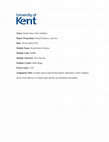
Advocacy of the conservation and improvement of the natural world is a relatively new movement, w... more Advocacy of the conservation and improvement of the natural world is a relatively new movement, which has only seen real involvement within the past fifty years. In this same period, many leading voluntary organisations have become household names; Greenpeace, Friends of the Earth, The Royal Society for the Protection of Birds, World Wide Fund for Nature (WWF). While the “green” movement itself has become more widely accepted as an important one, the function and value of the voluntary sector is less clear. This essay will seek to analyse the importance of the voluntary sector’s role in the conservation and environmental movement by analysing historic and current examples. The following paragraphs will include a brief timeline of the environmental volunteering movement in Britain, a more detailed description of the United Kingdom’s conservation status, followed by a few international comparisons, and finally, a section on this author’s personal experience and perception. It should be noted that the definitions of a “non-governmental organisation” (NGO) and “voluntary organisation” can be highly varied, but will here refer to a not-for-profit, voluntary citizens group (NGO UK, 2013). By better understanding the role of the voluntary sector in this increasingly powerful movement, the influence of charitable, private, and governmental organisations can be better utilised.

The Chatham Dockyard Historical Society (CDHS) was created in 1984 by Brian Jenkins, a dockyard e... more The Chatham Dockyard Historical Society (CDHS) was created in 1984 by Brian Jenkins, a dockyard employee, in order to preserve artefacts from the Dockyard and the Royal Navy. The Society has never had as much control over daily operations compared to the Trust, and this seems to create conflict between the two groups. The Historical Society keeps a small museum in one of the retired dockyard buildings, produces research, holds lectures, and provides a platform for former employees and their families to meet regularly (CDHS, no date). Chatham Dockyard has been the focus of much historical research, but the narratives of those who experienced the closure has not been recorded since media coverage of the closure itself, and has not been researched. Many volunteers currently in the historical society witnessed the operation, closure, and decline of the docks has not been recorded since the media coverage of the closures in 1984.
This unique perspective serves as the main research interest in this study: How have members of CDHS transitioned from and adjusted to working in the Dockyard to volunteering for the museum?
The following paragraphs will outline a research design attempting to gauge the question: is the... more The following paragraphs will outline a research design attempting to gauge the question: is there evidence of a balanced relationship in Lambeth’s Freshview programme, and how is that relationship is sustained? Are their goals (financial benefit, community socialization, etc.) congruent? Is there conflict, and is it stifled, or discussed openly with the council? How do members of the public interact with government employees while on a project? A more interpretive approach is used here, so these secondary questions will be re-evaluated throughout the study.
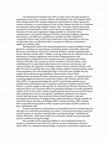
The Randomised Controlled Trial (RCT) is often cited as the gold standard in quantitative social ... more The Randomised Controlled Trial (RCT) is often cited as the gold standard in quantitative social science research (Robson, 2011; Shadish, Cook, and Campbell, 2001). Such a design involves the random assignment of participants to either a group that receives treatment, or a control group, in order to best compare the effect of a treatment and eliminate confounding variables (Robson, 2011). This paper will first discuss the importance of randomisation within social research, focusing on RCTs, followed by a discussion of some quasi-experiment designs possible to a researcher when randomisation is not possible. Repeated treatment, matching, weighting, regression discontinuity, and differences-in-differences methods are often considered a comparably inferior choice to RCTS and, indeed, have many drawbacks to take into consideration, they can effectively reflect a treatment’s influence and statistical significance (Robson, 2011).
This paper reviews a study on evolution-based mating preferences in lonely hearts advertisements.... more This paper reviews a study on evolution-based mating preferences in lonely hearts advertisements. A number of classical and recent studies are used for support, evidence, and explanation of this small, observational study. Eighteen students chose 10 ads from the female and male section, to count for mention of physical attractiveness, wealth, young age, or old age to test a number of hypotheses: males prefer younger females, females prefer older males, males offer wealth, while females seek males with wealth, and that females and males advertise physical attractiveness equally. The first four prove correct with reasoning from evolutionary research, but the last is not enforced in this study. However, it becomes clear that evolutionary factors are still present in mating preference.
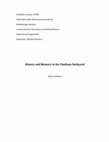
The Royal Dockyard at Chatham was closed in 1984 after over 400 years of shipbuilding and repair... more The Royal Dockyard at Chatham was closed in 1984 after over 400 years of shipbuilding and repair history. This exploratory research uses life history interviews with former employees who are now volunteering in the Chatham Dockyard Historical Society to answer the question: what is the nature of their history in the dockyard, and how does this relate to the memory and history they aim to maintain? While such research has been done on mining and steel-making communities in the UK and the US, this research reveals the history of what was once a thriving industry and the experience of affected individuals. Four life history interviews provided rich data, and were analysed using a grounded narrative approach to best understand the complexities of each participant’s life course. This research brings attention to a field available for further study and adds to the understanding of how an individual’s past and present interact in the making of contemporary history.
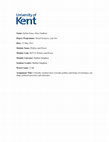
In his book, Man’s Search For Meaning, psychologist Victor Frankl recalled his experiences in Naz... more In his book, Man’s Search For Meaning, psychologist Victor Frankl recalled his experiences in Nazi concentration camps, saying:
"…There were always choices to make. Every day, every hour offered the opportunity to make a decision, a decision which determined whether you would or would not submit to those powers which threatened to rob you of your very self, your inner freedom; which determined whether or not you would become the plaything of circumstance, renouncing freedom and dignity to become moulded into the form of the typical inmate."
At its heart, the study of everyday politics and everyday resistance seeks to establish the validity of such a statement, not only in the horrific circumstances of the holocaust, but in everyday interactions. These decisions, choices, and powers can also accumulate to shape larger political processes and outcomes. To understand the meaning of everyday politics, this essay will begin with a review of definitions. The remainder will then be framed around three classical studies and their critiques: Kerkvliet’s (2005) study of peasant politics, Scott’s (1985) research on everyday resistance, and finally Nina Eliasoph’s (1997) work on the political apathy in American communities. In addition to the established literature, there are an endless number of examples where one can see the real implications of everyday politics, some of which will be included throughout. Through classic and applied studies, it is clear that everyday politics and resistance is crucial to not only understanding, but altering political processes and outcomes. As Victor Frankl rightly suggests, everyday choices and interactions should never be taken for granted, since larger powers can be affected.
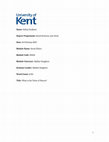
Rolston (1991 p.73) asserts that the topic of environmentalism ‘stretches classical ethics to the... more Rolston (1991 p.73) asserts that the topic of environmentalism ‘stretches classical ethics to the breaking point’. While debate pertaining to the ethics of humanity and other life-forms has long been discussed, it is difficult, but necessary, to apply moral theory to our environment as a whole. This particular essay was inspired by a lawsuit in Eugene, Oregon, in which two teenagers sued the governor over the degradation of Oregon’s natural resources (House, 2015). This case has been replicated across the country, and initially prompts a number of ethical topics and questions which humanity may not have time to discuss or act upon. Assuming, as all ethical beings should, that there ought to be an ethic framework concerning the environment, it is important to establish how classical ethics relate to this increasingly important discussion (Rolston, 1988). The following paragraphs will first examine the value of nature from the perspective of virtue ethics, and then refute this position with the utilitarian philosophy. By including literature and real-world examples advocating each position, the contrasting perspectives on this topic will become clear. Ultimately, both perspectives advocate some form of respect for our natural world and both should be further considered by policy-makers, corporations, and individuals for the better of humanity.

In The Three Worlds of Welfare Capitalism (1990), Gøsta Esping-Andersen sought to describe the di... more In The Three Worlds of Welfare Capitalism (1990), Gøsta Esping-Andersen sought to describe the differences between welfare states, and group those with significant similarities. By researching decommodification, the extent to which welfare is provided independently from the market, and stratification, the extent to which welfare access differs between social classes, Esping-Andersen provided an influential classification that has influenced much more comparative research and regime typology literature. However, there is concern over whether or not the typology retains explanatory power, both at the time of publishing, and as time has progressed. This essay discusses the typology in more detail, followed by a brief acknowledgement of the limits and value of ideal-type research. Next, three main critiques on the theory will be examined: the role of Mediterranean countries, the analysis of the Antipodes, and the exclusion of gender theory and informal welfare. Finally, the future of the welfare state, and role of path dependency and convergence theory will be discussed. This essay will show that, while Esping-Andersen’s original welfare typology still retains a strong explanatory power, there are a number of aspects that merit further consideration.
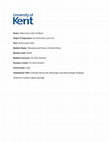
One of the major contributions to comparative social policy research is Gøsta Esping-Andersen’s 1... more One of the major contributions to comparative social policy research is Gøsta Esping-Andersen’s 1990 welfare regime typology, which identifies the key differences and similarities between provision of welfare in Western welfare systems. Sorting eighteen OECD (Organisation for Economic Co-operation and Development) countries into three categories was a relatively new area of comparative research, which was inevitably met with a great deal of criticism. The following paragraphs will outline the typology itself, present the successes of the theory, and lastly discuss the criticisms, pointing out examples and counter-arguments throughout. The theory, its successes, and its criticisms draw attention to the evolving subject, creates a historical record of perspectives of welfare regimes, and encourages further analytical progress. By discussing the virtues and failures of Esping-Andersen’s typology, this essay concludes that the theory should be valued as a landmark piece of research despite the many criticisms, in part due to the continuous assortment of responses and attention he drew to the field of study.
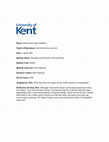
The most recent global financial crisis quickly became a clear challenge for social policy (Jorda... more The most recent global financial crisis quickly became a clear challenge for social policy (Jordan, 2010). The credit crunch, or the sudden unavailability of credit or loans, officially began in 2007and lead to what is now regarded as a global financial crisis, or recession (Parkinson, Ball, Blake, and Key, 2009). The 2010 spending review begins by recognizing that the state has borrowed one pound for every four it spent, making austerity measures an ‘urgent priority.’ Central government has since instilled long-term strategies, which greatly affect public services, the welfare system, and social policy as a whole (Spending Review, 2010). As the United Kingdom (UK) is now slowly returning to a pre-recession economy, the question of overall impact is a large topic of discussion. This essay will present evidence of the way economics, politics, and wider societal attitude has impacted British social policy, to conclude that ¬¬¬¬the future of social policy is still very much debated, and although the recession has had a number of implications in each aspect, the degree of impact is mostly unknown. At the heart of it, social policy is not, and will never be a static subject, making the impact of the recession such a decisive and important topic to consider.
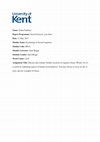
Social cognition refers to the analysis of how internal thought processes relate to our social ex... more Social cognition refers to the analysis of how internal thought processes relate to our social experience (Reber, 2004). The most important factor in this area of study is actually the individual doing the cognizing, and how perceptions of the self affect social behaviour (Wyer & Srull, 1994, p. 154). Although perceptions of the self have an integral role in our social experience, research on cognitive illusions and biases reveals an array of notable errors in thinking, judgement, and memory, many of which are not recognised on a normal basis. If there are three varieties of the self-concept—the actual, ideal, and ought self—then inconsistency between the three results in cognitive dissonance or mental discomfort and must be eliminated in favour of one feature (Markus & Wurf, 1987). This essay discusses several such biases in self-perception and evaluates the relation between research and aspects of human behaviour. By exploring the role of the positivity bias, bias blind spot, introspection illusion, transparency, above-average effect, motivated scepticism, defensive pessimism, self handicapping, and their wider implications, the psychology of individuals and society can be better understood. Most importantly, research in social illusions and biases reveal the limitations of our own thought processes and the areas in which individuals should aim to become more aware of their natural tendencies.
A Diary For Timothy (1945) follows new-born Timothy Jenkins through the first six moths of his li... more A Diary For Timothy (1945) follows new-born Timothy Jenkins through the first six moths of his life, which coincide with the end of World War Two. As the film continues, the viewer is introduced to an array of characters on the homefront, and it soon becomes clear that the film represents more than an account of daily life in 1944. In this analysis, the depiction of the homefront, effects of war, and the future will be discussed, with references to scenes and symbols within the film. Above all, A Diary For Timothy interprets the mood of the British homefront during a promising, but delicate time in our history.
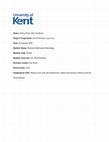
In the past decade, visual advertising has changed dramatically, using eye-catching models and gr... more In the past decade, visual advertising has changed dramatically, using eye-catching models and graphics to grab a potential customer’s attention has become increasingly common. Advertisements for clubs circulated in on the University of Kent campus are no exception, often portraying heavily sexualized models and images, which beg the question- what do female students think about these images, and how do the ads affect their university experience? This particular study analyses these topics by comparing interviews from young University of Kent and American female university students, which ultimately reveals only slight differences. As university is commonly a time of self-discovery, the responses of participants reveal the general perspectives and ideals of young women, who have been surrounded by the aforementioned style of advertising for the better part of their lives. Further research should certainly be encouraged, in the more specific aspects of this study.
Drafts by Selina G A Faulkner
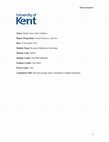
The idea of university as the great equaliser, promoter of social mobility, and vehicle of self-a... more The idea of university as the great equaliser, promoter of social mobility, and vehicle of self-actualisation is not a new one. However, current criticism of higher education as a magnifier of inequality has become better understood. Current research on inequality in the UK’s higher education system often focuses on socio-economic factors, parent’s education, ethnicity, and other more abstract topics. Inequalities between different genders and the two sexes is more often discussed in developing countries, but it’s worth continually assessing the true equality of higher education in the UK. This paper will discuss the ideal methods to be used when exploring the ways and extent to which females experience sexism at the Universities at Medway campus. The following report will include a loose outline of the optimal techniques to be used and recognition of potential weaknesses. In this particular study, ‘higher education’ will refer to a university-level programme enrolment. The focus will remain on “sex” which is solely biological, rather than “gender,” referring to the range of physical, behavioural, and mental characteristics, since the latter is overly complex for this study’s purpose. This research will provide a small-scale account of sexism in the university system, which can later be compared to larger studies. The results will reveal to what extent the simple defining factor of one’s biological sex creates a different university experience.
Chatham Dockyard was closed in 1984, and has since been redeveloped as a museum, run by the Chath... more Chatham Dockyard was closed in 1984, and has since been redeveloped as a museum, run by the Chatham Historic Dockyard Trust in tandem with the Chatham Dockyard Historical Society. Almost all volunteers in the Historical Society were once employed in the working docks and offer a unique perspective on the transitions that have taken place in Chatham. Their perspective is undocumented and may provide a valuable resource on the experiences of deindustrialization, unemployment, volunteerism, and attachment to a space and community. This proposal suggests life history interviews and a sequential thematic analysis as a method of understanding volunteer’s experiences. Such an approach will provide rich data and a potentially valued source for understanding such a significant transition.
Talks by Selina G A Faulkner
Presentation on genetic enhancement in the military reviewed from a Kantian ethics perspective.










Uploads
Papers by Selina G A Faulkner
This unique perspective serves as the main research interest in this study: How have members of CDHS transitioned from and adjusted to working in the Dockyard to volunteering for the museum?
"…There were always choices to make. Every day, every hour offered the opportunity to make a decision, a decision which determined whether you would or would not submit to those powers which threatened to rob you of your very self, your inner freedom; which determined whether or not you would become the plaything of circumstance, renouncing freedom and dignity to become moulded into the form of the typical inmate."
At its heart, the study of everyday politics and everyday resistance seeks to establish the validity of such a statement, not only in the horrific circumstances of the holocaust, but in everyday interactions. These decisions, choices, and powers can also accumulate to shape larger political processes and outcomes. To understand the meaning of everyday politics, this essay will begin with a review of definitions. The remainder will then be framed around three classical studies and their critiques: Kerkvliet’s (2005) study of peasant politics, Scott’s (1985) research on everyday resistance, and finally Nina Eliasoph’s (1997) work on the political apathy in American communities. In addition to the established literature, there are an endless number of examples where one can see the real implications of everyday politics, some of which will be included throughout. Through classic and applied studies, it is clear that everyday politics and resistance is crucial to not only understanding, but altering political processes and outcomes. As Victor Frankl rightly suggests, everyday choices and interactions should never be taken for granted, since larger powers can be affected.
Drafts by Selina G A Faulkner
Talks by Selina G A Faulkner
This unique perspective serves as the main research interest in this study: How have members of CDHS transitioned from and adjusted to working in the Dockyard to volunteering for the museum?
"…There were always choices to make. Every day, every hour offered the opportunity to make a decision, a decision which determined whether you would or would not submit to those powers which threatened to rob you of your very self, your inner freedom; which determined whether or not you would become the plaything of circumstance, renouncing freedom and dignity to become moulded into the form of the typical inmate."
At its heart, the study of everyday politics and everyday resistance seeks to establish the validity of such a statement, not only in the horrific circumstances of the holocaust, but in everyday interactions. These decisions, choices, and powers can also accumulate to shape larger political processes and outcomes. To understand the meaning of everyday politics, this essay will begin with a review of definitions. The remainder will then be framed around three classical studies and their critiques: Kerkvliet’s (2005) study of peasant politics, Scott’s (1985) research on everyday resistance, and finally Nina Eliasoph’s (1997) work on the political apathy in American communities. In addition to the established literature, there are an endless number of examples where one can see the real implications of everyday politics, some of which will be included throughout. Through classic and applied studies, it is clear that everyday politics and resistance is crucial to not only understanding, but altering political processes and outcomes. As Victor Frankl rightly suggests, everyday choices and interactions should never be taken for granted, since larger powers can be affected.